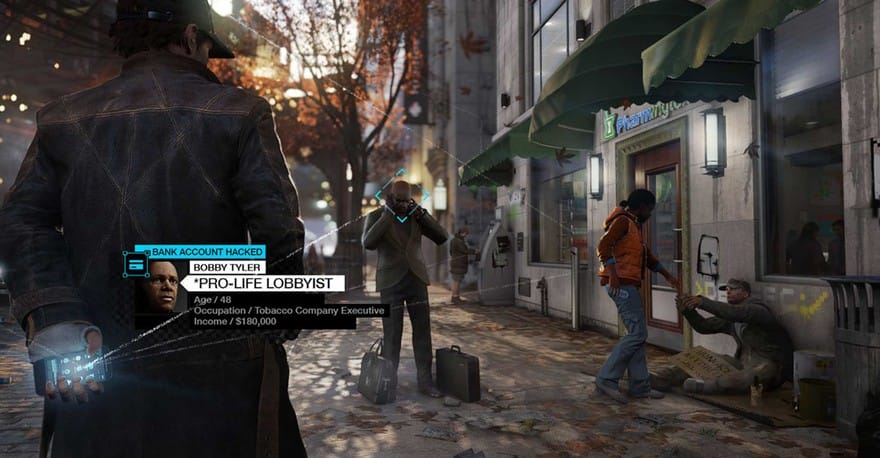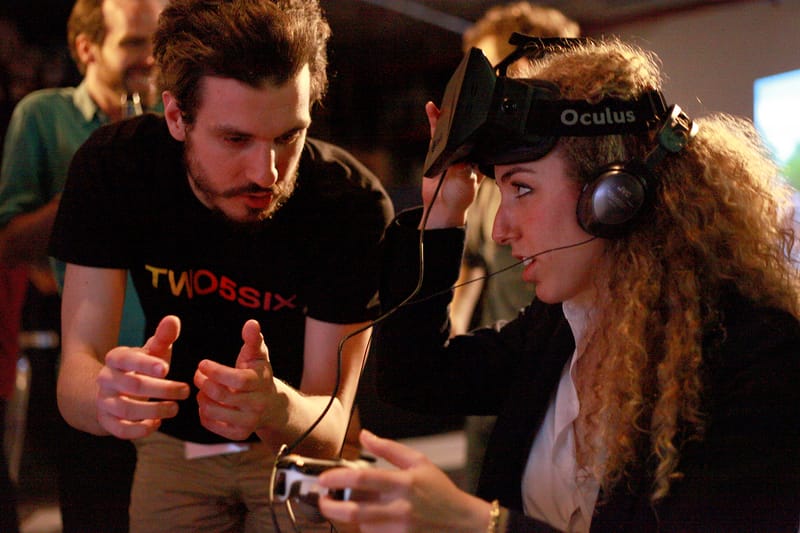This article is part of a collaboration with iQ by Intel.
Watch Dogs is set in a Chicago that looks very much like our own, though Ubisoft specifies that it takes place in the near future. This, it seems, is in order to allow the existence of its ctOS, a centralized operating system that controls almost every aspect of the city’s infrastructure. Traffic lights, bridges, security cameras, and more.
If you’ve played the game, used your magical smartphone to explode steam pipes, flip over enemy cars, and thought that the whole premise is a little ridiculous, I don’t blame you. It is. The near future in which a lone hacker can move through a city with impunity, lifting bridges, and making ATMs rain cash will probably never come about. These things exist in Watch Dogs because they’re fun to play with, and it is first and foremost a videogame. But on the other hand, a future in which critical aspects of our city’s infrastructure can be compromised digitally is startlingly close, if not already upon us.
Vitaliy Kamlyuk, Kaspersky Lab’s Principal Security Researcher and an advisor to the Watch Dogs development team, explained it to me in simple terms. “Typically, traffic lights are controlled by automated systems,” he said. “And of course all the policies and rules restrict them from connecting to the internet. However, if somebody brings a vulnerable device to work, and for some reason connects to that network, if that device is backdoored, and is connected to the internet via 3G or LTE, then he creates a potential breach to that isolated network of traffic lights system.”

Kamlyuk speaks perfect English with a Russian accent and he was very patient with my questions, but he doesn’t seem like the kind of guy with a high tolerance for nonsense. He likes and has played videogames, but says that these days, his job feels sort of like a game, having to solve puzzled of sorts on a daily basis. The company he works for, Kaspersky, is contracted by huge corporations and governments, assisting and consulting them on issues of cyber security. One of their recent contracts of note was the Sochi 2014 Olympic winter games.
Ubisoft approached Kaspersky about a year ago, hoping to make the technical parts of the game seem more realistic. It was right after it released a public report about a cyber threat it discovered called Red October. “It was a massive cyber espionage campaign that involved a number of modules to wiretap all kinds of data from computers, stored files, recorded audio, and video from webcams, and getting data from smartphones attached to the infected system,” Kamlyuk said. “I think that attracted their attention. They came to us and and decided to check with the security industry to make sure the game was more appealing to the players that were more technically advanced.”
None of which means that Watch Dogs is, after his involvement, necessarily realistic. He says the game should be seen more as a warning than something that could happen today, even if similar hacks do occur in the real world. He told me about two cases in Moscow, one in which a system of ATMs was backdoored and easily emptied, and another in which a network of speed cameras in the city numbering in the thousands was taken down in a matter of minutes. It took weeks to recover. It’s nothing on the scale of what’s presented in Watch Dogs, but could happen maybe “five to 10 years in the future,” he said.
How likely this future is has to do directly with how willing we are to connect and take advantage of these desperate networks. Kamlyuk mentioned the way in which we willingly opt in to this future, for example, by allowing Facebook to turn on the mics on our phones and listen to our surroundings, and with our current fascination with “the internet of things,” which brings more and more devices that were previously offline, online. Governments and private companies are also experimenting with technologies eerily similar to Watch Dogs’ ctOS. For example, Kamlyuk mentions Singapore’s Safe City Test Bed project, which aims to test systems that collect data from CCTV, audio surveillance, and social media.
“Watch Dogs is a good demonstration of how these city management systems can become a real-life threat to others”
Keiji Yamada, senior vice president and head of NEC Laboratories Singapore, one of the groups participating in Singapore’s Safe City Test Bed, said that data can then be used to “extract some of the symptoms of some accidents or some crimes,” so it can alert the government agencies accordingly.
“[Watch Dogs] is a good demonstration of how these city management systems can become a real-life threat to others,” Kamlyuk said, “because you have a great power in your hands, and you can try it in the game, you can feel what’s available to you, how you can change other people’s lives, people around you. That opens the eyes of many people, I think. They understand that this is actually risky, and if it is implemented, it must be implemented with the top level of security.”





